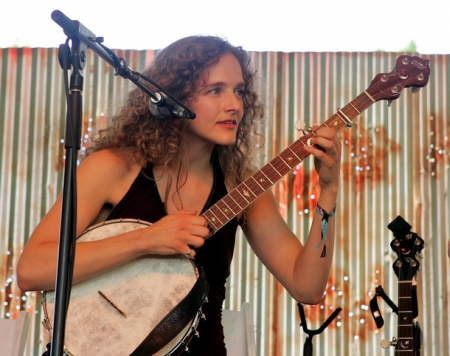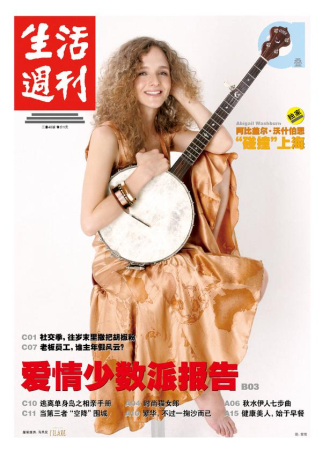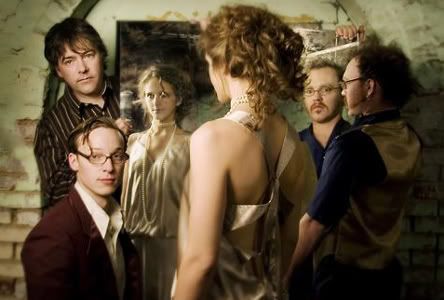Or maybe just "game irresponsibility".
In other news, steampunk Legos? Because plastic goes so well with brass, steam, copper and wood. But they are fun to peruse. (And thank you, Lady Seraph, for the tip.)
Now then, I've been meaning for some time to discuss Abigail Washburn, as part of the erratically continuing steampunk music series. Her work with the Sparrow Quartet (composed of Béla Fleck's banjo, Ben Sollee's cello, and Casey Driessen's fiddle) could easily be lifted entire and played as the backdrop for any episode of Firefly. But that's only part of the story.

She plays clawhammer banjo, which describes a particular style (also, amusingly enough, practiced by such notables as Bob Carlin, Steve Martin and Joseph Bethancourt--though, to be fair to Joe, he plays every style on the banjo, and well) of banjo-picking, which essentially transforms the picking hand into a "claw" (hence the name) to only pick the strings in a 'down' motion (as opposed to up and down picking motions). It's certainly not the only way to play banjo, though it is one way that's largely identified with the roots music movement.

While she had musical interests as a child, as Miss Abigail grew to adulthood, different things called her heart. One of these things was China, and Asian culture at large (in fact, she was the first Asian studies major at Colorado College). Another was the practice and the principles of law. Between one thing and another, she ended up in Beijing on a travel Visa and fell in love with the culture, and the country. She made the decision to return home only long enough to pack, and then go back and finish her work towards her international law degree.
This is where the story gets interesting.
When she came home, friends of hers invited her out to listen to various and sundry, and, without clear intent, she ended up on stage, playing. This eventually led to her joining the Uncle Earl band and recording two albums with them.
She was still intending to go back to China.
Along the way, she entered a songwriting contest in North Carolina, and this brought her to the attention of her current label--and Béla Fleck. Fleck produced one solo album with her, and then, part planned, part simple musical cohesion, ended up as part of the Sparrow Quartet.

Now, she splits her time between the states, and China, her chosen homeland. Only she returned with a banjo and a backup band, not a law degree. In China, she plays to small packed houses who cheer and stomp when she sings in Mandarin, songs formerly only sung in English.
She hasn't given up; but she says the music fills her heart now, and there's always later for law. We're very grateful the music's there for her, because that means it's there for us.
Listen to Abigail Washburn and the Sparrow Quartet perform "Danwei Music" with Hanggai, a Mongolian acoustic band, in China.
Or from another live performance, "A Fuller Wine", a song showcasing her style in English.
Or have a taste of my favorite of hers so far, "Kangding Qingge", in that recording performing live--and yes, that is Miss Abigail singing in Mandarin. She speaks it fluently, which always seems to amaze and delight Chinese people (and a fair number of people in other cultures, considering).
She's also on MySpace.
Now, why do I consider roots music (and not just artists from the American roots movement, but the growing international roots music movement) part and parcel of what's evolving into steampunk music? Because it's not all Abney Park airships and Vernian Process soundscapes; a large part, I firmly believe, of what steampunk music may be, must be, relies on what's near to hand--just as a scattering of tools and some stretched canvas can, in the right hands, be turned into a flying machine so mortalkin can ascend the air, so too must music be made from what's available.
Washboards. Sticks on walls, on pipes, on barrels. Hand-manufactured instruments--steam-powered organs, copper harps strung with pulled steel, pulling arpeggios out of tension wires, tapping out strange code on untested machines. The rarefied shining flutes and elegantly polished violas are not, in this light, steampunk in the least--but the well-worn banjo, the untrammeled variety of vocal expression, and the sheer desire, the need, to make music however we can--that is as vital to steampunk music as the unimaginable devotion to art and craft for the rest of steampunk.
So I add in Abigail Washburn into the growing multifaceted image of what steampunk music, at its heart, is. Give her a listen. You might like it.
2 comments:
keeping kids "safe" to the point that they have chips implanted so their parents know where they are, 24/7
There are already service advertising the tracking of your kid's simcard via GPS "so you can keep an eye on them" or some waffle. Or prepare them for big brother once they reach adulthood.
Music I shall listen to and get back to you.
Over here, they already have not only regular cell phones implanted with GPS trackers, but 'kidsafe' large-button phones with the same tracking tech onboard from the manufacturer.
I don't know if you'll like Washburn or not--I know she's got fabulous musicians behind her, and she's pretty damned amazing, herself, but--you know, hardcore Chinese Appalachian hill music, it's not for everyone. :)
Post a Comment